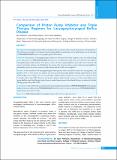Please use this identifier to cite or link to this item:
https://hdl.handle.net/20.500.14356/1316| Title: | Comparison of Proton Pump Inhibitor and Triple Therapy Regimen for Laryngospharyngeal Reflux Disease |
| Authors: | Pokharel, Apar Mayya, Jaya Prakash Upadhyay, Hari Prasad |
| Citation: | PokharelA., MayyaJ. P., & UpadhyayH. P. (2020). Comparison of Proton Pump Inhibitor and Triple Therapy Regimen for Laryngospharyngeal Reflux Disease. Journal of Nepal Health Research Council, 18(3), 513-519. https://doi.org/10.33314/jnhrc.v18i3.2493 |
| Issue Date: | 2020 |
| Publisher: | Nepal Health Research Council |
| Article Type: | Original Article |
| Keywords: | Helicobacter pylori Laryngopharyngeal reflux disease Rapid urease test |
| Series/Report no.: | Jul-Sep 2020;2493 |
| Abstract: | Abstract Background: Laryngopharyngeal reflux is retrograde flow of contents of the stomach to the larynx and the pharynx. The study aims to compare two regimens (proton pump inhibitor monotherapy versus triple therapy) on the outcome of Helicobactor pylori positive laryngopharyngeal reflux disease. Methods: The presence of laryngopharyngeal reflux was determined by reflux symptom index and reflux finding score. The presence of Helicobactor pylori in the tissue was confirmed by rapid urease test. All urease test negative laryngopharyngeal reflux patients were given a course of proton pump inhibitors and results were evaluated. All urease test positive patients were divided into two groups. One group was given a course of proton pump inhibitors and another group was given a course of triple therapy and the results were compared. Results: A total number of 704 laryngopharyngeal reflux patients were screened for urease test. Among them 138 patients (19.6 %) were urease test negative and were given proton pump inhibitor therapy. Improvement in both reflux finding score (average score 11.75) and reflux symptom index (average score 5.25) score was observed after 3 months with p-value<0.05. In urease test positive patients, improvement in scores was observed in both proton pump inhibitors and triple therapy group, however marked improvement in the clinical features was observed in triple therapy group with p-value<0.05. Conclusions: The study reveals association between laryngopharyngeal reflux and Helicobactor pylori. Proton pump inhibitor therapy is sufficient if no Helicobactor pylori is detected, however incase of presence of Helicobactor pylori, triple therapy gives better results. Keywords: Helicobacter pylori; laryngopharyngeal reflux disease; rapid urease test |
| Description: | Original Article |
| URI: | http://103.69.126.140:8080/handle/20.500.14356/1316 |
| ISSN: | JNHRC Print ISSN: 1727-5482; Online ISSN: 1999-6217 |
| Appears in Collections: | Vol. 18 No. 3 (2020): Vol. 18 No. 3 Issue 48 Jul-Sep 2020 |
Files in This Item:
| File | Description | Size | Format | |
|---|---|---|---|---|
| 2493-Manuscript-18851-1-10-20201115.pdf | Fulltext Article. | 567.31 kB | Adobe PDF |  View/Open |
Items in DSpace are protected by copyright, with all rights reserved, unless otherwise indicated.
